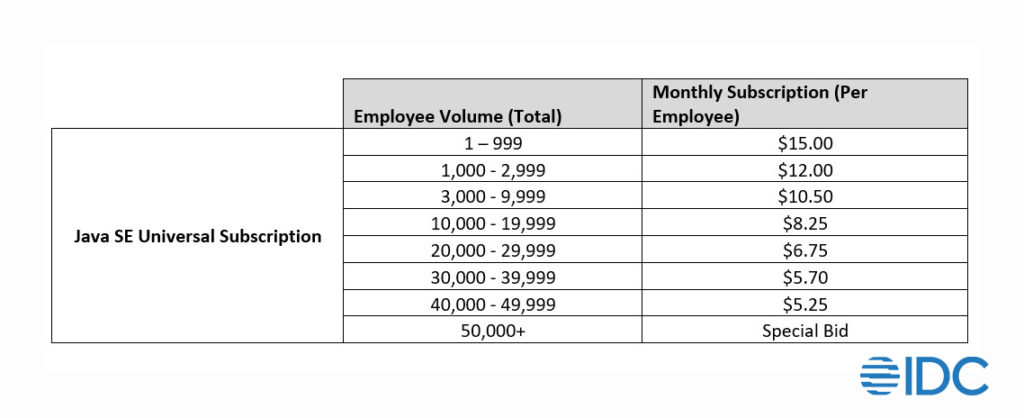As of January 23rd 2023, Oracle has replaced Oracle Java SE Subscriptions commonly purchased by customers with a new Oracle Java SE Universal Subscription.
Whilst the previous Subscription was licensed in effectively two different ways depending on whether the software was utilized on a Server or Desktop (Personal Computer) the new Universal Subscription has new ‘Employee’ terms. Note that these terms differ slightly to previous Oracle “Employee” terms, and are as follows;
Employee for Java SE Universal Subscription: is defined as (i) all of Your full-time, part-time, temporary employees, and (ii) all of the full-time employees, part-time employees and temporary employees of Your agents, contractors, outsourcers, and consultants that support Your internal business operations. The quantity of the licenses required is determined by the number of Employees and not just the actual number of employees that use the Programs. For these Java SE Universal Subscription licenses, the licensed quantity purchased must, at a minimum, be equal to the number of Employees as of the effective date of Your order. Under this Employee metric for Java SE Universal Subscription Programs(s), You may only install and/or run the Java SE Universal Subscription Program(s) on up to 50,000 Processors, If Your use exceeds 50,000 Processors, exclusive of Processors installed and/or running on desktop and laptop computers, You must obtain an additional license from Oracle.
Source – https://www.oracle.com/us/corporate/pricing/price-lists/java-se-subscription-pricelist-5028356.pdf
Effectively, the new terms require customers to now purchase sufficient subscriptions in line with the Total Number of Customer Employees, regardless of whether they utilize/leverage the software directly, indirectly or not at all. A customer with a small number of installs and a high number of employees, could see bills in the $Millions per annum.
As an example, a customer with 20,000 employees utilizing JAVA SE in any capacity under the new subscription terms would need to purchase JAVA SE Universal Subscriptions for all 20,000 Employees, at a monthly rate of $6.75, total $1.62M per annum.
Furthermore, there is a requirement to license Employees, Agents, Contractors, and temporary workers from third parties that support internal business operations of the customers, which will require further consideration and perhaps increase counts considerably.
For new customers this latest model will apply immediately and for existing customers this model might apply at next renewal. Whilst Oracle may signal that existing customers might be able to renew under the previous terms, this shouldn’t be considered a guarantee. Initial published costs for the model are as follows:

When considering server deployments, the requirements to count Processors (Oracle Defined Processors) is still required although perhaps less emphasized, as by licensing all Employees, customers receive a grant of up to 50,000 Processor installations without extra charge (a further charge will apply to customers with higher Processor requirements). Those previous customer concerns around Virtualized Environments could likely still apply to customers when counting to that limit, noting the 50,000 Processor grant is still governed and defined by the same terms and definitions which have proved challenging to some customers previously.
Further information on pricing, full terms and further details can be found here:
What should customers do?
Overall, costs for many customers could be higher than those previously, therefore customers might choose to consider the impact of these changes on future renewals, gathering overall employee and partner counts, along with assessing Processor requirements in line with Oracle terms and definitions, to estimate any potential future requirements.
Furthermore, customers may wish to establish, or re-establish, assessments of third-party alternatives to Oracle JAVA that might fulfill their requirements, including both paid for and open-source options, in order to avoid potential costs.
Where assessments have been made to requirements with both the current and the revised model, IDC Pricing Evaluation customers can seek to benchmark pricing and obtain further advice on commercial optimization and strategy.
Finally, for customers that do not use Oracle JAVA, consideration might still be made, noting that Oracle terms are accepted on the download of the software and that Oracle monitors downloads from the JAVA website, therefore controls on the permission, access, download, and installation of Oracle JAVA might be seen as key to ensure large liabilities are not generated.
IDC’s Sourcing Advisory Services (SAS) provides you with the industry’s most-recognized price benchmarks, analyst advice and IT optimization insight. Learn more.




